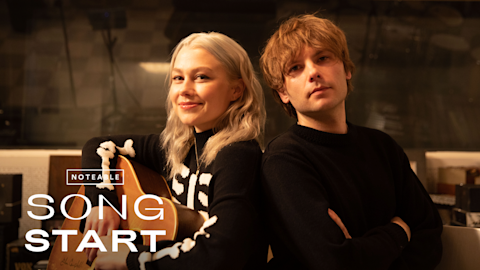The San Francisco indie pop veteran is a tireless collaborator.
Though lots of artists proudly lay claim to control-freak tendencies, Sonny Smith isn’t one of them. He does juggle solo records with albums by his namesake band, Sonny & The Sunsets, but the Bay Area indie pop whiz has always been happy to hand a rein to someone else in the name of collaboration.
Thanks to that diplomatic attitude, which very much echoes the whimsical warmth of his genre-hopping songwriting, Smith has worked with a dream cast of other artists. In 2018, Black Keys frontman Dan Auerbach produced Smith’s jangly, earworm-packed solo album Rod for Your Love and released it on his Easy Eye Sound label. Smith himself had previously produced albums by Shannon and The Clams and Cool Ghouls, and enlisted Merrill Garbus of Tune-Yards to produce The Sunsets’ 2016 album, Moods Baby Moods.
The new Sunsets album, Hairdressers From Heaven, which dropped April 1, continues that tradition, produced as it was by James Mercer and Yuuki Matthews from The Shins in Mercer’s backyard barn studio in Portland. Besides featuring contributions from such Bay Area indie all-stars as Kelley Stoltz and Shayde Sartin (The Fresh and Onlys, The Skygreen Leopards), the album was the first release on Smith’s newly founded label, Rocks in Your Head. The label also plans to release a compilation highlighting lesser-known Bay Area bands in mid-July—and will include a handmade zine with every copy—followed by a tie-in festival a week later.
Smith intends to produce all the releases on Rocks in Your Head himself, and will work with emerging acts like Galore and Preschool. With all his experience on both sides of the mentor/protégé relationship, we asked Smith about the benefits and challenges of working with others.
Spotify for Artists: How did James and Yuuki from The Shins come on board to produce your new album?
Sonny Smith: I had been in touch with the late Richard Swift about making a record for quite a while. We were sending demos back and forth, but he died [before it was finalized]. We had [also] been talking about doing it with Mercer, and he was interested. He said he wasn’t really a producer, but he wanted to try it anyway.
It seems like there were a lot of happy surprises, in terms of instruments and ideas.
I think so. I really wanted to make a record where the sound jumps all over the place and yet still sounds like a cohesive record. There is this instrumental, almost jazz song [“Man Without a Past”] with a sax and stuff, right after a country song with shaggy harmonies [“Take a Hard Look Down the Long Corridor”], before a drum machine jam [“Drug Lake”]. I just wanted to not have a record that would be easily pigeonholed.
You’ve made so many records by now. Why did you even need an outside producer?
Need is probably not the right word, because yeah, I can produce records. [But] on all of my records, I’ve endeavored to try something new. They tend to be different. There was one that was kinda countrified [2012’s Longtime Companion] that was a lot of people’s favorite, directly followed by one that was more synth-heavy and New Wave-y [2013’s Antenna to the Afterworld]. Whenever I’ve gotten a producer, it’s about how we can make it different.
Last year you made a solo album with Dan Auerbach. What was that like?
He’s much more of a classic producer. You go to Nashville and work at his studio, which is set up the way he wants it. He works quite quickly—we were doing four to six songs a day, getting them all the way to the finishing point. He’s got his system down, and he’s one of those producers who really imprints his own sound on it. He likes to play on the record, adding guitars and stuff, which I was totally into. Whereas I’ve produced records where I didn’t want to play on them.
How does your work as a producer fit into the picture?
I’ve never advertised myself too hard as a producer. But I’ve been producing a lot lately for the new label. I’ve produced a couple new bands just this year, and embraced San Francisco [more]. Galore is one I’ve produced and am putting out; Preschool, I just produced one of their songs for the compilation. They’re pretty great.
Did you take any lessons from Dan Auerbach’s label, Easy Eye Sound?
I did, actually. I liked the idea that he set out to produce all the records on the label. I don’t know how long he can humanly keep that up, but it’s a nice way to create a sound for your label. When he first talked about doing a label, I thought, “Y’know, that sounds like a headache.” But then after a while, I appreciated that he was doing it. Mostly I just liked that model of producing the bands.
Did you have any mentors early on?
Not really. When I was in my 20s, I was always trying to play with older musicians—guys who had lots of skills, because I was still trying to learn. But I’ve [now] gone the opposite way, where I’ve started feeling like all these guys in their 50s are know-it-alls. [Laughs] I’ve been veering back to trying to play with people who don’t necessarily have it all figured out, and learn from them.
You’re maybe absorbing the enthusiasm they have at that age.
Yeah, their minds are more open in certain ways. There have been creative things where I thought maybe I knew the best way, and then the [younger] band says something else and I was delighted to be wrong. Like, we don’t have to go back to the chorus after the bridge. [Laughs]
It’s good that you’re open that way.
People who are just starting out, and just writing songs for the first time, can’t always execute them well enough. But if they’re executed too well, by session guys or something, it just takes the life out of it. So there’s this beautiful spot to find [in the middle].
—Doug Wallen
Popular Stories
video
How Julia Wolf Made It




